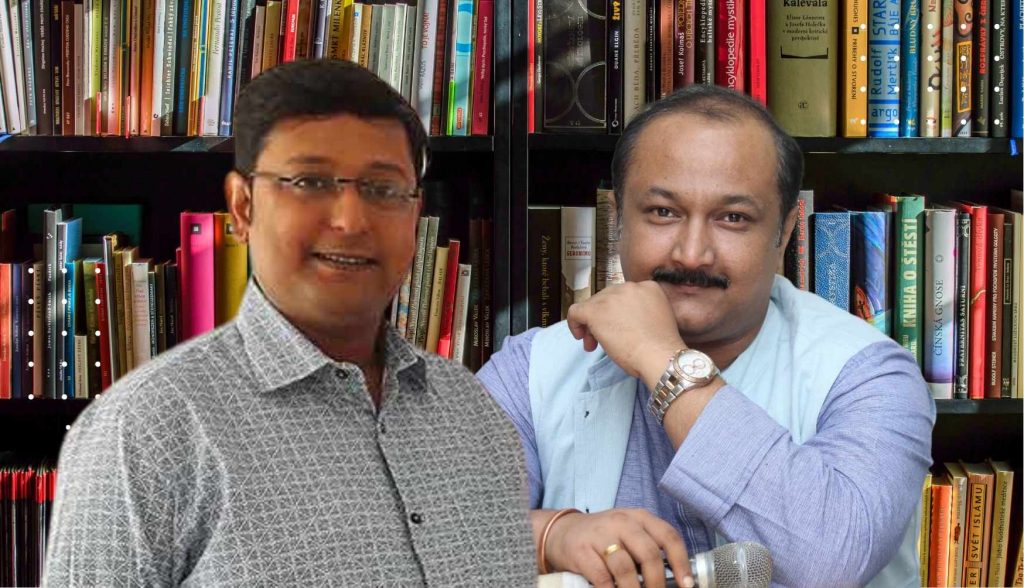
 Amidst some of the positive returns of the pandemic is the return to reading books. There has been a noticeable surge in the publishing industry influenced by established startup entrepreneurs, sometimes by wantrepreneurs, yet sometimes by aesthetes those who use books for egalitarian shelf decoration. But whatever is the end purpose, at the forefront, publishing is doing well, asserts Dr. Kiriti Sengupta.
Amidst some of the positive returns of the pandemic is the return to reading books. There has been a noticeable surge in the publishing industry influenced by established startup entrepreneurs, sometimes by wantrepreneurs, yet sometimes by aesthetes those who use books for egalitarian shelf decoration. But whatever is the end purpose, at the forefront, publishing is doing well, asserts Dr. Kiriti Sengupta.
Who is Dr. Kiriti Sengupta? Dr. Kiriti Sengupta is a critically acclaimed Indian English Poet, who along with the Indian novelist in vernacular Bangla, Bitan Chakraborty, are the Joint Directors of Hawakal Publishers, a private limited literary publishing house from India with over a decade of contribution. The company that started in 2008 as a small office in Kolkata bootstrapped to profit with a boutique office in New Delhi.
Now, we see that in October 2021, Inkitt, an app-based digital book publishing company, raised $59M in Series A from the managing general partner of NEA, Scott Sandell; German publishing giant Axel Springer, Chairman of SNAP, Michael Lynton; the chairman of the Holtzbrinck Publishing Group, Stefan von Holtzbrinck and Kleiner Perkins along with HV Capital, Redalpine, and Speedinvest. This doesn’t impress Dr. Sengupta or Mr. Chakraborty.
“We do not have any plans to go digital in the near future. It suffices to have a website that enables global purchase and delivery of books in the traditional format, purely based on our experience of the publishing industry wherein the pleasure of holding a book in the hands outweighs all digital advancements in publishing. We focus on the literary, not even academics or business,” asserts Dr. Sengupta.
As per Mr. Chakraborty, publishers in India will continue to publish printed books. Many individuals have switched to e-books in response to the pandemic, yet e-books are not the most comfortable medium. Nothing compares to the sensation of holding a book in your hands—the texture of the paper, the smell of freshly printed pages, the ritual of placing the book under the pillow or on the bedside table, marking a line or two to use as a quote somewhere, and signing the final page with a date all contribute to the rituals of reading. In India, reading a book is a major daily practice, not just a leisure activity, even if the book is a standard romance or science fiction.
Chakraborty further adds that numerous bookstores have closed their doors during the outbreak. The average footfall at bookstores lacking a café has plummeted. Readers are utilizing web portals at a higher rate than ever recorded previously. Online commerce has transformed dramatically over the last two years, particularly for books. Regrettably, books are not considered vital commodities. The epidemic has taught the publishers of this publishing house from India how to prioritize mental health. When they faced major disruption in book delivery, they knew that being publishers, there could not be a bigger roadblock than what they have overcome already.
Drawing from the mindsets of the Joint Directors of Hawakal Publishers, it is clear that in the publishing startup ecosystem, the duo is not likely to become a digital publisher but work at the intersection of the digital avenues as purchase and payment gateway and hard copy publishers of fiction, nonfiction, and poetry. But here comes the sales aspect of this indie publisher that prioritizes its online book sales via the Hawakal website over other ecommerce platforms, including Flipkart and Amazon in India. For foreign distribution, they leverage Amazon both for printing and distribution.
Defying the way the global publishing industry has transitioned to digital-only with exceptions to Random Penguin House and other well-funded top publishing houses, Hawakal Publishers, over the last ten years, is wholly sustainable on its own revenue that profitable enough to help the duo move from Kolkata to Delhi and invest in modest property positioned as Hawakal headquarters. This profitability is also handsomely rewarding to authors interested in publishing via Hawakal.
Close speculation brings us to understand that a business can be profitable without sneaking into the pockets of investors and cultural sponsors. With a paid-up capital of INR 2,00000, the publishing house from India is at peace with its ambition of fine publication without stepping into vanity metrics detrimental to the brand image of authors not welcomed for refusing to trickle through a necessary gatekeeping of high aesthetics.
Dear Reader,
First, thank you for your precious time reading the stories (without paywalls) I publish on Startups to Enterprises covering the EU, China, the US, and India. Second, I request you to contribute financially (any amount) to help me sustain this as an independent digital business news media.
If I receive a request for a sponsored post, I ensure I see merit that is meaningful for erudite and informed readers like you. In the bargain, I lose out on sponsorships wherein I need funds to sustain this effort. Your contribution helps me stay afloat.
Please note that your contribution is treated as revenue generated and not a donation; hence, there are no 80G or other donation certificates. In fact, as I am eligible to pay for the revenue generated, I will pay taxes on the same.
You deserve to know that I abide by journalistic ethics and practices to ensure I tell the stories as is, unbiased. You can follow us on Facebook, Linkedin, and Twitter, bookmark us on Google News, and finally, PayPal us here.
Founding Editor
Linda Ashok
